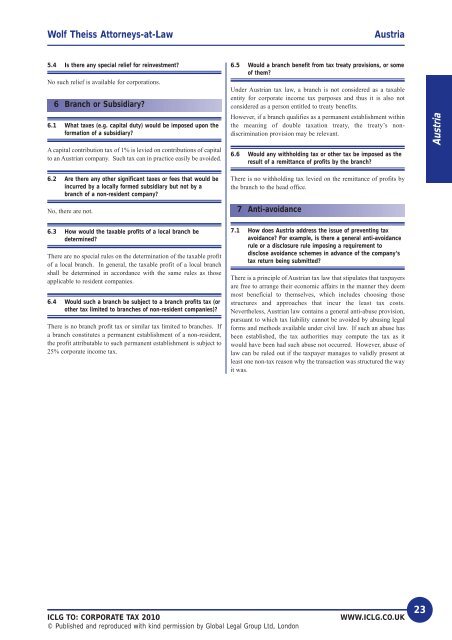Corporate Tax 2010 - BMR Advisors
Corporate Tax 2010 - BMR Advisors
Corporate Tax 2010 - BMR Advisors
You also want an ePaper? Increase the reach of your titles
YUMPU automatically turns print PDFs into web optimized ePapers that Google loves.
Wolf Theiss Attorneys-at-Law<br />
Austria<br />
5.4 Is there any special relief for reinvestment<br />
No such relief is available for corporations.<br />
6 Branch or Subsidiary<br />
6.1 What taxes (e.g. capital duty) would be imposed upon the<br />
formation of a subsidiary<br />
A capital contribution tax of 1% is levied on contributions of capital<br />
to an Austrian company. Such tax can in practice easily be avoided.<br />
6.5 Would a branch benefit from tax treaty provisions, or some<br />
of them<br />
Under Austrian tax law, a branch is not considered as a taxable<br />
entity for corporate income tax purposes and thus it is also not<br />
considered as a person entitled to treaty benefits.<br />
However, if a branch qualifies as a permanent establishment within<br />
the meaning of double taxation treaty, the treaty’s nondiscrimination<br />
provision may be relevant.<br />
6.6 Would any withholding tax or other tax be imposed as the<br />
result of a remittance of profits by the branch<br />
Austria<br />
6.2 Are there any other significant taxes or fees that would be<br />
incurred by a locally formed subsidiary but not by a<br />
branch of a non-resident company<br />
No, there are not.<br />
There is no withholding tax levied on the remittance of profits by<br />
the branch to the head office.<br />
7 Anti-avoidance<br />
6.3 How would the taxable profits of a local branch be<br />
determined<br />
There are no special rules on the determination of the taxable profit<br />
of a local branch. In general, the taxable profit of a local branch<br />
shall be determined in accordance with the same rules as those<br />
applicable to resident companies.<br />
6.4 Would such a branch be subject to a branch profits tax (or<br />
other tax limited to branches of non-resident companies)<br />
There is no branch profit tax or similar tax limited to branches. If<br />
a branch constitutes a permanent establishment of a non-resident,<br />
the profit attributable to such permanent establishment is subject to<br />
25% corporate income tax.<br />
7.1 How does Austria address the issue of preventing tax<br />
avoidance For example, is there a general anti-avoidance<br />
rule or a disclosure rule imposing a requirement to<br />
disclose avoidance schemes in advance of the company’s<br />
tax return being submitted<br />
There is a principle of Austrian tax law that stipulates that taxpayers<br />
are free to arrange their economic affairs in the manner they deem<br />
most beneficial to themselves, which includes choosing those<br />
structures and approaches that incur the least tax costs.<br />
Nevertheless, Austrian law contains a general anti-abuse provision,<br />
pursuant to which tax liability cannot be avoided by abusing legal<br />
forms and methods available under civil law. If such an abuse has<br />
been established, the tax authorities may compute the tax as it<br />
would have been had such abuse not occurred. However, abuse of<br />
law can be ruled out if the taxpayer manages to validly present at<br />
least one non-tax reason why the transaction was structured the way<br />
it was.<br />
ICLG TO: CORPORATE TAX <strong>2010</strong><br />
© Published and reproduced with kind permission by Global Legal Group Ltd, London<br />
WWW.ICLG.CO.UK 23
















